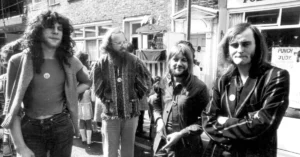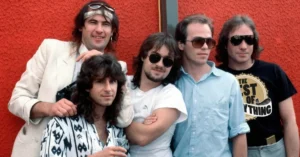Pink Floyd: Sonic Innovators and Architects of Conceptual Rock
Pink Floyd. Formation and Origins
Pink Floyd formed in London in 1965, originally comprising:
- Syd Barrett – Guitar, vocals
- Roger Waters – Bass, vocals
- Richard Wright – Keyboards, vocals
- Nick Mason – Drums
Originally named The Tea Set, they soon adopted the name Pink Floyd, taken from two American bluesmen, Pink Anderson and Floyd Council. Led by Syd Barrett in their early years, the band became central to London’s underground psychedelic scene, known for extended improvisations and surreal visuals.
Pink Floyd. Musical Style and Innovation
Pink Floyd evolved from psychedelic rock into a pioneering force in progressive and conceptual music, known for:
- Epic, atmospheric compositions
- Philosophical and existential lyrics
- Innovative sound design using synths, tape loops, and effects
- Immersive concept albums
- Groundbreaking stage production with lights, projections, and elaborate visuals
Their music explores alienation, war, mental illness, greed, and time, often in album-length narratives rather than standalone singles.
Pink Floyd. Key Albums and Highlights
The Piper at the Gates of Dawn (1967)
Their debut, led by Syd Barrett, was a whimsical and otherworldly cornerstone of British psychedelia. Songs like “Astronomy Domine” and “Lucifer Sam” revealed Barrett’s lyrical surrealism.
A Saucerful of Secrets (1968)
Barrett’s departure due to mental health issues led to David Gilmour joining. This transitional album moved toward spacey, instrumental experimentation.
Meddle (1971)
A significant step toward progressive rock mastery. Side two contains the 23-minute “Echoes”, a stunning sonic journey through mood and texture.
The Dark Side of the Moon (1973)
A landmark in music history, this album spent over 900 weeks on the Billboard chart. Seamlessly exploring madness, mortality, money, and time, it featured crystal-clear production and classics like “Time,” “Money,” and “Us and Them.”
Wish You Were Here (1975)
A tribute to Barrett and a critique of the music industry. Includes “Shine On You Crazy Diamond” and the haunting title track.
Animals (1977)
A politically charged concept album loosely based on George Orwell’s Animal Farm. Gritty and dark, it presents a biting critique of society through tracks like “Dogs” and “Pigs (Three Different Ones).”

The Wall (1979)
A rock opera masterpiece about isolation and psychological collapse, written by Waters. Featuring “Another Brick in the Wall (Part II),” “Comfortably Numb,” and “Hey You,” it was later adapted into a feature film.

The Final Cut (1983)
A bleak, orchestral album and Waters’ final record with the band, focused on war and loss. Less collaborative but still conceptually powerful.
Pink Floyd. Post-Waters Era and Beyond
Roger Waters left in 1985, declaring the band “a spent force.” However, Gilmour, Mason, and Wright continued under the Pink Floyd name, releasing:
- A Momentary Lapse of Reason (1987)
- The Division Bell (1994), featuring “High Hopes” and “Keep Talking.”
After a long hiatus, the band reunited briefly at Live 8 in 2005 — a historic and emotional performance. In 2014, they released The Endless River, a mostly instrumental album built from unreleased Division Bell sessions, as a tribute to Richard Wright (who died in 2008).
Pink Floyd. Legacy and Cultural Impact
Pink Floyd is one of the most successful and influential bands of all time:
- Over 250 million albums sold worldwide
- Pioneers of the concept album format
- Major influence on prog rock, ambient, post-rock, and alternative music
- Their visual artistry (from Storm Thorgerson’s surreal covers to live shows with Mr. Screen and floating pigs) has become iconic.
Their fusion of philosophy, sound experimentation, and narrative cohesion remains unmatched.
Interesting Facts
- The Dark Side of the Moon is often said to sync up with The Wizard of Oz (a fan-created phenomenon called Dark Side of the Rainbow).
- The inflatable pig from Animals famously escaped during a photo shoot and disrupted Heathrow Airport.
- The Wall live shows featured a literal wall being constructed and torn down on stage.
- All four classic members are now deceased or retired from touring, though Waters and Gilmour have both pursued solo careers.




